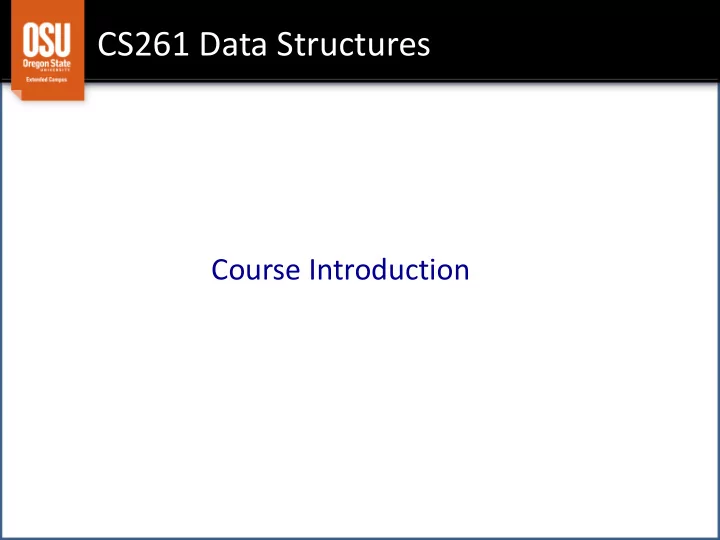

CS261 Data Structures Course Introduction
Class Description • General-purpose data structures and algorithms • Topics: – managing complexity, – lists, – queues, – trees, – heaps, – hash tables, – graphs.
Class Description • Prerequisites: – CS 162 – MATH 231 – Basic programming skills – Some prior experience with Unix
Why study data structures? Fundamental in program design. Design efficient programs! You don’t want to write a program that takes forever to run and occupies all the memory.. Nor does any company want this (interview questions)
Why study data structures • Simplify programming – Many structures are common and well-studied – Knowing those saves a lot of time – As well as debugging effort
Example • The search problem: Where is it? John Doe Mary Lin Eric Zimmerman Amanda Jones Tasha Funchess • How fast can we do it? Carolyn Chandler • What if we need to: … … – Update the list very often – Search many times
Class Description • Prerequisites: – CS 162 – MATH 231 – Basic programming skills – Some prior experience with Unix
Awareness • Awareness when programming: – How long will my program take to run? – How much memory will it take? – Can I design it to be more efficient? – How much more efficient? – What does it take to make it more efficient?
Class Information • Instructor: Prashant Kumar • Office: 3040 KEC • Office hours: Mon 4-6PM • Textbook (required) – Dr. Budd’s Online Textbook • Reference Book (Highly recommended) – C Pocket Reference • Course Website: http://people.oregonstate.edu/~kumarp/CS261_Summer18/
Structure of the Course • Weekly Reading • Lectures Final Grade Breakdown • Worksheets in Class 40% Assignments 30% Midterm • 5 Assignments 30% Final Exam • 1 Midterm • 1 Final Exam
Program Development • You may use any development environment to write your code • We will write our code in ‘C’ with the C99 standard • I highly recommend that you become very familiar with a debugger and debugging strategies – Variables view – Expressions – Step over, into, out • All assignments must compile (using gcc) and execute in the linux environment on flip.engr.oregonstate.edu – First recitation will exercise this
Preparation and Attendance • Regularly attend class • If you miss a class, you are still responsible for learning the material covered during that class. • Do not expect a private tutorial if you skip lectures and/or recitations.
Conduct • Be on time • Mute cell phones • You are encouraged to ask questions
Academic Honesty -- Homework • Honesty: – Absolutely essential for learning to occur – Forms the foundation of your professional integrity • Ok Discuss concepts, general approaches, bugs
Collaboration • You are expected to do your own work! • OK to talk about general approaches and strategies with other students • Do not simply let someone else tell you how to solve the problem • Do not let someone else copy your work
Makeup Policy for the Exams • Contact the instructor at least 5 days in advance to arrange for an alternate date/time • When the student is disabled, check http://ds.oregonstate.edu/ • No makeup for students who miss a midterm, or final exam without an excused absence
Recommend
More recommend